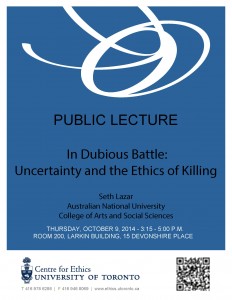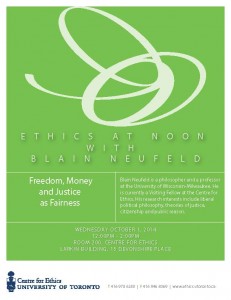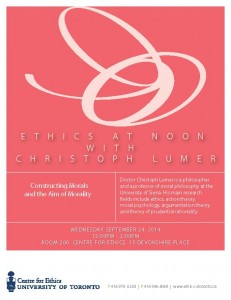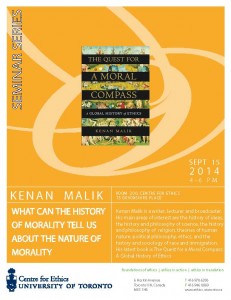Keynote Presentation: “Animals and the Promise of Citizenship”
Sue Donaldson and Will Kymlicka
Friday, April 25th, 5-7PM
Emmanuel College, Rm. 001
Open to the public. Free registration required on Eventbrite.
REGISTRATION IS FULL * * * Please click on the Eventbrite link if you would like to be added to the waitlist
The keynote lecture will be followed by responses from:
Stefan Dolgert
Assistant Professor of Political Science
Brock University
Camille Labchuk
Animal rights lawyer and advocate with
Animal Justice Canada
Ayelet Shachar
Canada Research Chair in Citizenship and Multiculturalism
Professor of Law, Political Science and Global Affairs
University of Toronto
CONFERENCE PANELS
All panels will be held in the Centre for Ethics Conference Room (Room 200), Gerald Larkin Building, 2nd Floor, 15 Devonshire Place
Open to the public
FRIDAY, APRIL 25TH
12-1:30PM : This Land was Made for You and Me – Bodies and the Natural Environment
Chair: Kyumin Ju, Department of Political Science, University of Toronto
Attila Atander, Western University: “Kant and Hegel on Our Duties to Preserve the Living Body and the Natural Environment as Loci of External Freedom”
Seon Tyrell, York University: “The Silent City – Towards Regenerating Cemeteries in Toronto”
Sydney Faught, University at Albany: “A Second Honeymoon: Animal Liberation and Environmental Ethics”
Discussant: Angela Fernandez, Associate Professor of Law, University of Toronto and Coordinator of the Jackman Humanities Institute Working Group, “Animals in the Law and Humanities”
2-4:00PM: Blurred Lines -the Ethical (In)Significance of Species Membership and Cognitive Capacities
Chair: Dan Hooley, Department of Philosophy, University of Toronto
Travis Timmerman, Syracuse University: “A New Argument Against Speciesism”
Darren Chang, UBC Animal Welfare Program: “From Creating Space to Building Solidarity with Laboratory Rats”
Benjamin Davies, King’s College London (UK): “Species Exclusivism and Cognitive Disability”
Alexandra Peabody, New School: “Rejecting Hierarchy: Aristotle, Cognitive Disability, and the Exclusionary Force of Compulsory Rationality”
Discussant: Stefan Dolgert, Assistant Professor of Political Science, Brock University
SATURDAY, APRIL 26TH
10:30-12:00PM: Living and Dying Well – on Embodiment, Eudaimonia, Personhood and Perversity
Chair: Sean Hillman, Department for the Study of Religion (with collaboration in Bioethics and South Asian Studies), University of Toronto
John Brennan, New School: “Recognizing Moral Bodies”
Duane Long Jr., UT Austin: “A Defense of the Ethical Status of Sadomasochism”
Jessica Adkins, Marquette University: “Finding the Good in Dying: Defending Physician Assisted Death of the Akratic Agent”
Discussant: Donald Ainslie, Associate Professor of Philosophy, University of Toronto
12:30-2PM: Considering the Other – Ethical Communities of Flesh, Ecology and Suffering
Chair: Alison Colpitts, Department for the Study of Religion, University of Toronto
Jonathan Singer, DePaul University: “The Flesh of My Flesh: Animality, Difference, and ‘Radical Community’ in Merleau-Ponty’s Late Philosophy”
Oli Stephano, SUNY Stony Brook: “Non-Allergic Relations: Thinking Ecology with Levinas and Derrida”
Julian Jonker, UC Berkeley: “A Confucian Account of Animal Suffering”
Discussant: Oisín Keohane, Andrew W. Mellon Postdoctoral Fellow, Jackman Humanities Institute and Department of Philosophy
2:30-4PM: It’s a Sabotage – Terrorism, Civil Disobedience and Revolution in the Face of Global Injustice
Chair: Igor Shoikhedbrod, Department of Political Science, University of Toronto
Tayler Staneff, Brock University: “Animal Exploitation: Reform or Revolution?”
Jake Earl, Georgetown: “Global Justice and the Prince of Thieves”
Elliot Trapp, New School: “An Arendtian Interpretation of Environmental Liberation”
Discussant: Tom Malleson, Assistant Professor of Social Justice and Peace Studies, King’s (Western University)




